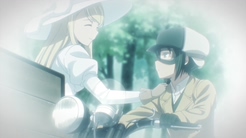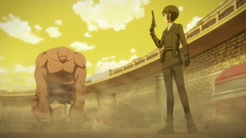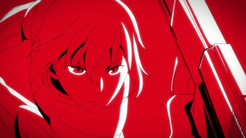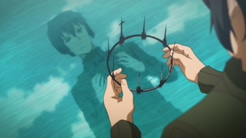In an odd turn of events, the second episode of Kino’s Journey 2017 is a retelling of a story done in the original 2003 version. Where Kino is forced to participate in deathmatches upon reaching a country. I find this choice odd as I would consider the Colosseum story in the original to be the weakest story as instead of Kino acting as an observer to the countries rules and society, she instead is an active participant. When asked as to which of the versions of this story I prefer, I would say the 2003 version did it better but more because that version gave this story two episodes which it could flesh it out more. However despite that it seems that this newer version is actually closer to the source material from what I have heard.
So today is a tale of revenge as shown by the subtitle of this episode presented at the end. We have several kinds of revenge here in this story. Petty revenge in how the cruel king killed his father due to his upbringing being too strict. Revenge for a loved one as Shizu came to kill his father for what he had done to his mother and him. Revenge out of principle as Kino kills the king for all the travelers that unknowingly went to his country and were forced into deathmatches. Then finally revenge out of grief as a young woman sends travelers to the country so that they can suffer as she has suffered. The last however is kept ambiguous enough that it could be seen as the woman sending Kino to the country knowing that she would end up killing the king but frankly I think that would require the woman to know Kino’s capabilities. No, I find her sending oblivious people to their deaths to be far more fitting as revenge need not be taken against those that wronged you. Some find themselves too weak to do so and settle for a simpler revenge, such as pushing others into misfortunes that have effect you. It’s fitting that at the end of all this the one that truly fulfilled their revenge deems the entire concept pointless as it indeed is pointless. Revenge is born out of a need to balance things out but it won’t truly bring anything of substance. Kino got her revenge and in the end only felt frustration over how she was tricked and used.
Again I don’t really like the level of participation Kino had in this story as she has passed through countries in a more reprehensible state than this and never passed judgement on them. Here she literally destroys a country with her new rule. It is not out of character for Kino to be so merciless to kill a country as she has shown the capability for killing or allowing atrocity. But it is a very emotional move on her part. You can find some poetic justice in how Kino refused to kill any of her combatants and instead had the audience which shouted for blood, kill each other. I would also like to believe that only the people in the colosseum would die, leave those not involved with the death games to guide the country. Though this seems to suggest that the entire country was doomed. Hard to be on Kinos side here when you take into account that her rule would apply to the children too. I am willing to make a bet that this will be the only remake of an old story in this version and I believe the only reason it’s here is just because of one thing. That being the character introduced in this story, Shizu and the talking dog Riku. In later stories sometimes the protagonist isn’t Kino and hermes but instead these two and i think the only real reason we got this episode was to make their introduction so we are not caught off guard later when they take to spotlight for later stories.





I double checked the novel just to be sure, and the new anime skipped the last line of Kino’s new rule: “Those who refuse to fight [for the title of king] will be stripped of their citizenship the moment they leave the country.” She gave those who didn’t want to fight a way out…skipping that line makes it sound somewhat more brutal then it was originally written.
And i checked the original anime version as well, in that she made it clear: only the first-class citizen who have to fight. They will get their citizen stripped off if they leave the country or abuse the poor. This new version intentionally skipped those conditions.
Good idea about checking the original anime too! I wonder why they would leave out that line? I don’t think it would have likely taken a long time to put in or anything, compared with the rest of the episode. Unless the people who are making the new series are mainly doing it to showcase the shock value or something…I really, really hope not. Though maybe I’ll double check the novel chapters of future eps for any other oddly missing major lines too, once the eps air, just in case…
I also think placing it this story so early in the series was a weird choice.
I wasn’t crazy about the story in the original anime either, but on top of it being more balanced and less brutal, it was also much later in the story and it kind of served as showing us another aspect of Kino.
Here it’s way too early, we don’t have a feel for Kino’s character yet and it’s more brutal than before. If I hadn’t seen the old Anime and read a couple of novels, I would have a very different idea of what kind of person Kino is, going by the new Anime.
I can only think that it’s deliberate. Not sure why though or whether it’s a good idea.
It’s been some time since I watched the original anime, but I agree that this version of the colosseum story is inferior. I seem to recall Kino talking more with other contestants and citizens. From the original, I liked the story with the three starving men in winter that was near the beginning of the series. The impression that Kino is empathetic but defensive and firm is pretty indicative of how I see her character. I hope the new series isn’t trying to make her some champion of justice.
That episode… the three starving men was the one that I still remember clearly till this day (I watched the show many years ago). Not necessary its best story, not even necessary realistic (want to go more details but in fear of spoilers…), but its moral ambiguity is something that leaves me with such a big impact.